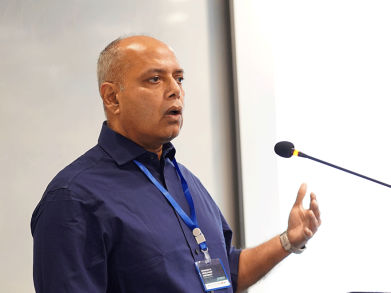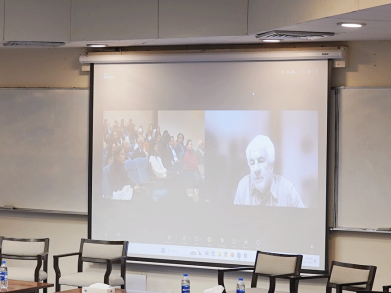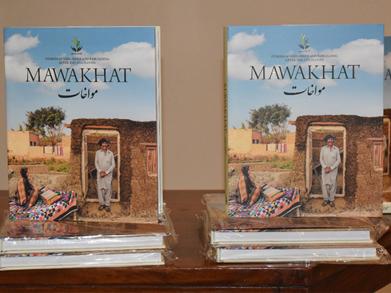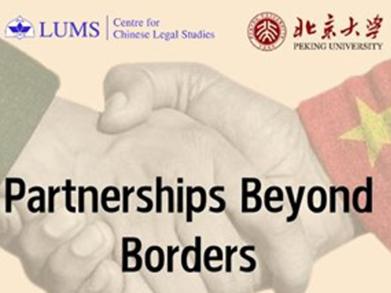Alumni Homecoming 2021: LUMS Leadership Comes Together to Discuss Future Directions of the University
The Fireside Chat with LUMS Leadership was an interactive session held at Homecoming 2021, with Vice Chancellor, Dr. Arshad Ahmad; Rector, Shahid Hussain, and Management Committee Member, Osman Khalid Waheed in attendance. The session was moderated by Mr. Adeel Hashmi, and LUMS alumni Mr. Ali Farid Khwaja (MS 2004), President of the LUMS UK Alumni Chapter and Ms. Saman Qureshi (BSc 2006), member of the Karachi alumni group, were also part of the conversation to ask questions regarding the future directions of the University.
Dr. Ahmad explained that students are essentially partners in terms of the academic functioning of the University. “They are also providing vital input to the decisions that are made at LUMS.”
Each School at LUMS has a council with student representation; decisions at the University are made with the help of students and they form part of the Steering Committee that determines the agenda of the highest academic body, which is the University Council. Students are also actively involved in Disciplinary Committee meetings.
“The students’ voice has always been very vibrant at LUMS.” he added. “Students here have that space to think about issues of the day and have their voices heard.”
For Dr. Ahmad, the need is to think how LUMS can foster a culture of entrepreneurship and spawn a mind set that successful entrepreneurs have. He outlined several initiatives at LUMS where this agenda is being actively pursued. “At the National Incubation Centre Lahore, we are deep diving in certain areas such as fintech, agritech and the environment where ideas come to life in the form of start-ups and accelerators. Others centres at LUMS are dealing with national issues like water, energy, learning, and big data, and the interaction between them will spawn entrepreneurship as well.”
He also explained that in order to have diversity on campus and accessible programmes, it is imperative to believe in internationalisation.
Mr. Hussain recognised the need for innovation in how LUMS works. “We will continue to develop new programmes to add more value for our students and we will continue to innovate. We need to develop linkages in other regions; whether it is through student and faculty exchange, or research collaborations in relevant areas.
“We are committed to empowered education and how to get knowledge and use it, and that is what we are essentially doing at LUMS.”
He gave the example of the Syed Babar Ali School of Science and Engineering for cutting edge research which has helped influence national policy on electric vehicles and established productive industry linkages.
The University’s role in resolving the grand challenges of the region was also discussed. “LUMS was set-up to be a catalyst for change. That is part of LUMS’s DNA. And if you look at the big existential challenges Pakistan faces, we are doing something to address them directly. For instance, the Centre of Water Informatics and Technology at LUMS is directly looking at optimal utilisation of cropping patterns and water fertilisation patterns through cutting edge technology with the support of governments,” added Mr. Waheed.
He also explained how Pakistan faces a drug resistance problem due to over-use of antibiotics, which in the future will lead to new strains of diseases that will be resistant to any kind of antibiotic. “This is a race against time as a lot of these resistant infections are coming out of Pakistan because of this overuse. The School of Science and Engineering at LUMS, and the Department of Biology in particular, is looking to set-up a centre of infectious diseases that will start a tissue bank for all these new strains of diseases such as pneumonia, tuberculosis, etc. so the world can study them.”
Another area where LUMS is tackling challenges head-on is at the Syed Ahsan Ali and Syed Maratib Ali School of Education (SOE). “A third of the world’s population of primary school aged children who are outside school live in Pakistan. That’s the scale of the challenge SOE is researching. It is using data-driven research to come up with policy suggestions so the money coming inside Pakistan to fix the education problem can be better utilised,” explained Mr. Waheed.
“Values such upholding merit, tolerance, diversity and integrity are very close to the heart of the Trustees and Founding Fathers of LUMS,” said Mr. Hussain. "LUMS would not have progressed had we not upheld these core values.”
LUMS has gone to great lengths to make sure that these values stay on the forefront of every discussion and every decision, whether it's for the admission process or the hiring of the faculty, he added.
Mr. Waheed stressed that “alumni are at the heart of any university’s sustainability. We are a young university, but we are looking hard at how we can better engage with our wonderful community of alumni.”
The LUMS leadership urged LUMS alumni to look after the University in any way possible. More than 14,000 alumni spread all over the world are the LUMS ambassadors and must continue to show their love by regularly giving back to their University, they said.
To watch the full session, click here.






















